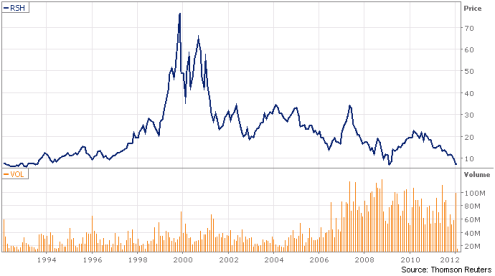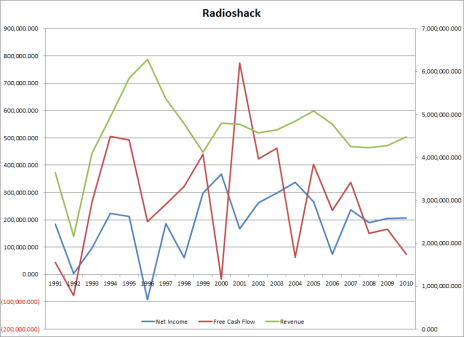Twitter As An (On-going) Experiment: An Investor/Trader’s Perspective
June 11, 2012 1 Comment
WHERE I’M COMING FROM
So I first joined twitter in 2009, when it was a much quieter place compared to what it is today. I was purely an observer/consumer at the time, not a participant or content contributor as I am now. I barely tweeted.
A few months before I joined twitter, I left the hedge fund I was with. I decided to try something different, and ended up working in start-up land in a CFO/Strategy capacity. Naturally, I ended up following VCs/Entrepreneurs on twitter more than investing/trading folk, as I was interested in learning about the kinds of people I’d be working with (besides, twitter was a barren desert in 2009 compared to what it is today, for finance folk). Between 2009 - mid 2010, twitter’s value to me was not clear, and I did not use it frequently. It served primarily as a source of news/public sentiment/entertainment for me.
Flash forward to Fall 2010: I started trading full-time because I saw an opportunity, (an investment theme) that seemed to offer incredibly favorable risk/reward. I re-visited twitter as I started trading, and noticed it was one of the better, if not best, platforms for obtaining real time news alerts related to this investment theme. I still remained an observer though, until mid-2011.
By mid-2011, I started tweeting my thoughts about single-stock ideas. If my memory serves me correctly, the stock I started tweeted about the most was YOKU, ticker for youku.com, the Chinese internet video company. It seemed like an obvious short to me when it was trading in the 50s. It was my largest short position at the time, and could not believe that 9/10 people who tweeted about YOKU never once mentioned a thing about its business. So I tweeted about YOKU’s business, its slowing growth, 1999/2000 dot com like valuation and my doubts about its viability as a for profit entity. What particularly got my attention was the dot com bubble like valuation, given the fear and low valuations prevalent in the China reverse merger space.
My short YOKU thesis , and tweets was = IPO lockup expiry + Slowing Growth + Competition Risk + Secondary Dilution + China Macro Risk + Dot Com Bubble Valuation + Risk that China RTO Fear moves over to China Internet Momo stocks … Suffice it to say, I felt pain (it melted up to 70 for no reason) before YOKU fell down to 15-20 by fall 2011.
My YOKU tweets got the attention of other fundamentally-oriented investors/traders, probably because my fundamentally-oriented tweets stuck out like a sore thumb nail. @DavidSchawel ( @bondtrader83 at the time ) was the first to notice my YOKU tweets, and we started having twitter conversations. The relationship blossomed, he introduced me to other ‘tweeps’ (short-hand for twitter people) , and that marked the beginning of my full-throttle participation in this twitter finance experiment. I thank David (and many others) who have made this unexpected journey possible.
WHERE I AM CURRENTLY
I need to follow fewer people. There are simply too many tweets for me to process now. If I want to check out what my stream was saying just 12 hours ago, twitter.com nor tweetdeck don’t allow me to do that, depending on the number of tweets my followers tweeted. Yes, I can lookup what a specific user said 12 hours ago, but I am unaware of an easy way to check what my entire stream was saying 12 hours ago. The one thing that has made it hard for me to unfollow people is, I have nothing against 9/10 people that I am unfollowing/will unfollow. This isn’t personal. In fact, I look forward to chatting/emailing with people who I unfollow. A follow/unfollow is not a vote of confidence. I simply cannot manage my current tweet load.
HOW TO USE TWITTER: FOR INVESTORS/TRADERS
Okay, I actually believe avoiding useless or even harmful tweeps/tweets is a good place to start. So below, I will focus on what NOT to do, so that twitter can be used to preserve, possibly enhance your wealth. If you simply avoid the tweeps described below, you are more likely to succeed, and find twitter helpful to your investing/trading decisions.
DO NOT FOLLOW OR AVOID THE FOLLOWING:
1. Now-Casters - There are plenty who seem to enjoy tweeting the obvious, stale, non-actionable headlines of the day. They seem to have an obsession with where the puck is now, not where it’s going. A slightly milder, but nevertheless equally useless cousin - those whose tweets focus solely on what everyone else does. APPL this, EUR USD that, blah blah blah. (I’m not referring to those who take a position, or explain why they are long/short…rather those who repeat the same chatter that only takes up space).
2. Armchair Finance/Econ Philosophers - These may seem enticing at first, and may be, if their thoughts/musings are pointing to an actionable investment theme. The problem I find, even among self-proclaimed ‘professional hedge fund managers’ I’ve followed, is most do not do this - most repeat the same macro China, Europe, and US superficial macro-wannabe analysis and theses that I can find elsewhere. No wonder they rarely share investment/trade ideas. There is one specific tweep I have in mind…if this person were a stock, I’d be massively short him, with 99% expected return.
3. Uber-Narcissists - I’m very glad to know y’all have social lives, are well-rounded, etc…here’s where it becomes a problem - 90% of your tweets are about your personal lives, 9% are ‘now-caster’ tweets, and 1% are incredibly value adding. I don’t need to follow you, because chances are, those 1% gold nuggets will be re-tweeted by others, or I will find them myself.
4. Comedian Wannabees - I love humor and try not to take myself too seriously. In fact, people who know me, know that I laugh easily and can be quite the clown. There are some tweeps who claim to be investors/traders, yet 70% of their tweets seem poor attempts at comedy… in fact one of these clowns sent me a direct message several months ago, asking me to re-tweet one of his tweets so he could get more followers. I did…then I unfollowed him. By the way, BarbarianCapital, who I believe is a must follow is NOT this. He’s funny in his own way, but his humor is a tool to share insight, NOT to try to win popularity contests.
5. The One-word Tweeter - There are tweeps who 50% or more of the time tweet 1-5 word, useless tweets. Their tweets are waste of space, pollute the stream, and provide needless distraction. If you pollute the stream with your ‘lol’, ‘thanks’, ‘buy high fcf stocks’, etc… well, good luck to you. I just hope your investing/trading decision-making aren’t as simplistic, lacking in thought, as your tweets are.
6. The Armchair Short-seller - If you see someone who has never shorted in his/her life, or is not short something he/she is discussing…or uses the word ‘overvalued’ more than a few times … avoid them. There is one specific ‘Armchair Short-seller’ who also happens to be one of the ‘Uber-Narcissists’ …if this person were a stock, I’d be massively short him, with 99% expected return.
7. The Finance ‘Expert’ Turned Political Pundit - Everyone is entitled to share and promote their political views, yet I would avoid following people who sound like they have politics all figured out, and excessively tweet about their naive political views. I’ve studied politics probably 10x more than these folks I have in mind, yet I’m surprised at how smug some of these suckers are…I’ve found an equal number of Republicans and Democrats who fit this profile. I recommend unfollowing, because I’m afraid their investment/trading sophistication is probably no better.
8. Teflon-proof Tweeps - We all make mistakes, I love the tweeps who own up to them, and also field criticism well. Avoid the tweeps who don’t seem to embrace the learning process (e.g. owning up to mistake), and avoid/ignore criticism. The only tweep who has blocked me to this day, is one I called out last fall. He failed to own up to his mistakes, and instead blocked me.
9. The Walking, Talking Investor Quote Generator - If you find someone saying, “be fearful when others are greedy, and greedy when others are fearful.” every time they want to justify some buy decision…unfollow. Their thesis should depend on the merits of the specific idea, not some generic quote they cite as if it were some holy prayer. I’m not criticizing those who cite investors…just those who recite the same bs to justify their investments/trades.
10. The After-the-Fact Expert - People who talk about how obvious something was after the fact…where were they before the fact? Before the news? Before the gap-down 50% or gap-up 50%? These suckers are so loud n noisy, the newbies think they’re actually the brains! Unfollow those who do not express ex-ante opinions/posts, and only talk about how obvious it is that NFLX went below $100.
“In the end money talks, and bs walks.” - A Hedge Fund Manager


